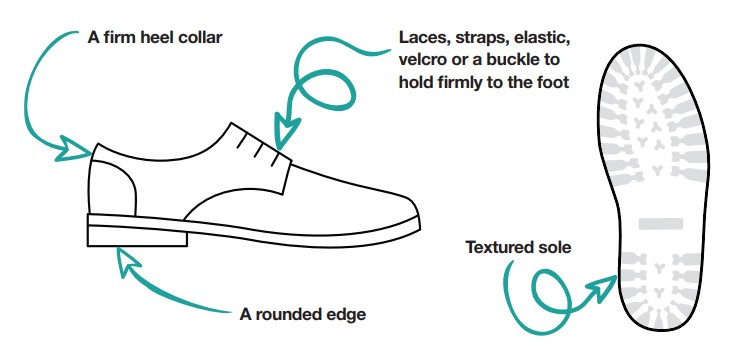As the only direct source of contact with the ground, footwear can affect an individual’s posture, stability, balance and gait, influencing the risk of falls. In addition, older adults may experience foot-related problems, such as foot pain, reduced range of motion, toe weakness and toe deformity, which are also risk factors for falls.
Older adults should see a podiatrist for a foot check annually or if they have any foot concerns. Podiatry WA can assist you in finding a podiatrist in an older adult’s local area.
What are the characteristics of safe footwear?
Heel height
Safe footwear should have a broad heel that is round in shape and less than 2cm in height. Shoes are more stable when more surface area of the sole is in contact with the ground, resulting in more stable and balanced walking.
Mid-sole cushioning
A safe shoe will contain a foam material in the mid-sole for comfort, but not too much that the foot is unstable and cannot feel the ground.
Textured sole
The slip resistance of the outer sole of a shoe is important to prevent slipping. Too much tread can cause the shoe to grab the ground, while a smooth, slippery sole will make the shoe slip, increasing the risk of having a fall.
Bevelled heel
A bevelled or rounded heel improves slip resistance and reduces the risk of falls by increasing the surface contact area of the shoe as the heel strikes the floor.
Heel collar height
A firm, supportive heel collar helps to support the foot.

The Stay On Your Feet® Shoe Safety Checklist is a great tool to start the conversation with older adults about shoe safety. The Shoe Safety Checklist can be ordered and delivered at no cost in WA via the Injury Matters resource ordering website and is a great resource to have on hand in podiatry clinics.
How can I assist older adults to wear safe footwear?
There are three key factors to consider concerning feet and footwear when assessing an older adult’s falls risk:
- Footwear: Are the older adult’s shoes safe, and do they fit well?
- Foot conditions: Does the older adult have foot pain or any other foot issues?
- Referral: Do you need to refer the older adult to a podiatrist who may be able to assess these problems further and make recommendations for footwear?
Foot care for Aboriginal and Torres Strait Islander older adults
Moorditj Djena (Strong Feet) is a podiatry and diabetes education outreach program for Aboriginal and Torres Strait Islander peoples within the Perth metropolitan area. The program provides culturally appropriate podiatry and diabetes education, focusing on preventing and managing foot complications and their risk factors such as diabetes, peripheral arterial disease, peripheral neuropathy and other chronic diseases.
Services provided by the multidisciplinary Moorditj Djena team include:
- Podiatrists: Assessment, treatment and education of all foot-related concerns.
- Aboriginal Health Workers: Health interventions for prevention methods, education, support and advocacy.
- Diabetes Educators: Assist clients to self-manage their diabetes effectively and prevent complications.
- Dietitians: Discuss healthy eating for diabetes and other chronic conditions, including ideas for shopping on a budget, cooking nutritious meals and providing recipes.
People with diabetes may be at an increased risk of falling due to damage to the foot’s nerves and blood supply. For more information about the link between diabetes and foot health, please refer to Diabetes WA.







